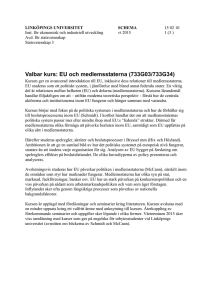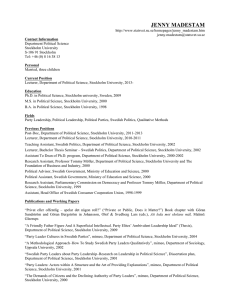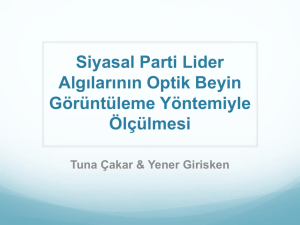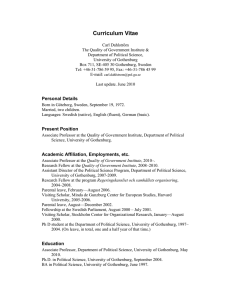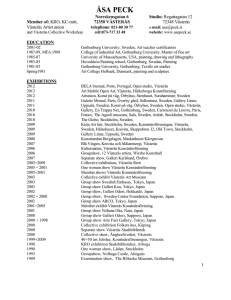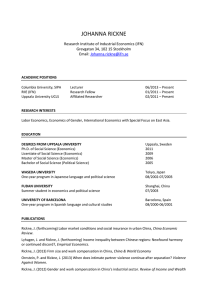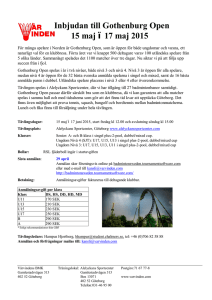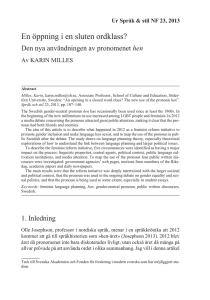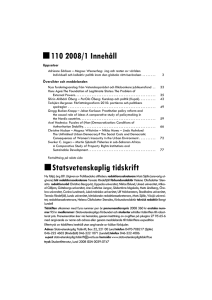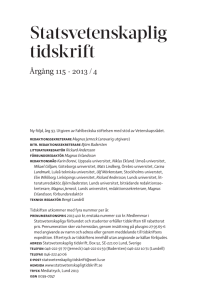CURRICULUM VITAE - Statsvetenskapliga institutionen
advertisement
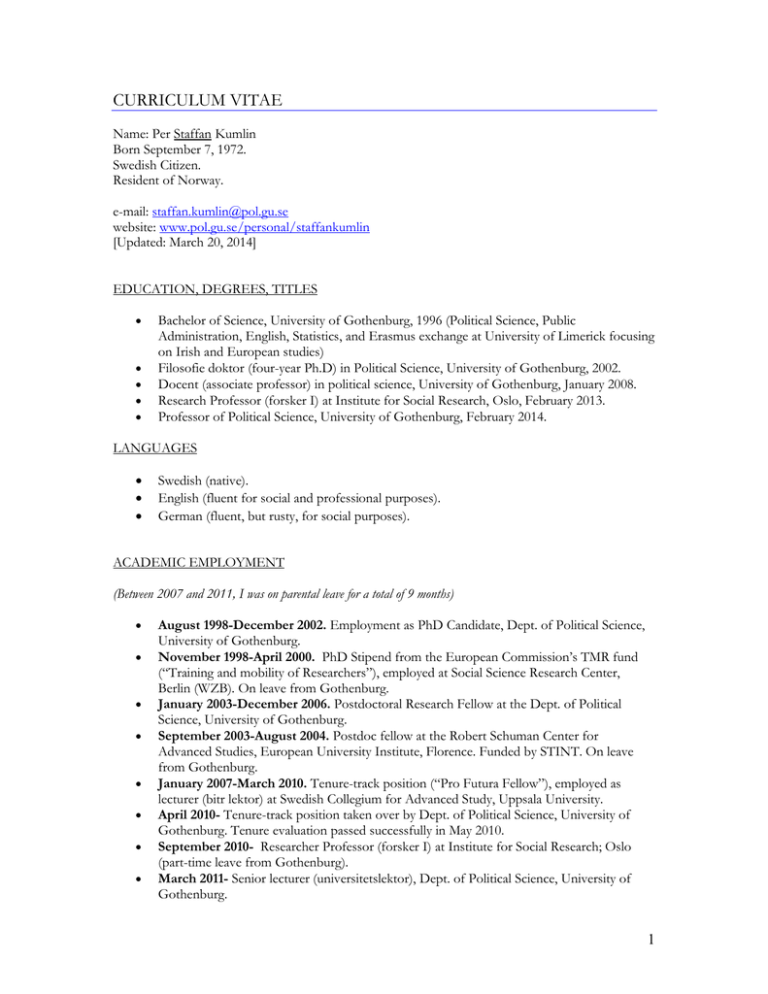
CURRICULUM VITAE Name: Per Staffan Kumlin Born September 7, 1972. Swedish Citizen. Resident of Norway. e-mail: staffan.kumlin@pol.gu.se website: www.pol.gu.se/personal/staffankumlin [Updated: March 20, 2014] EDUCATION, DEGREES, TITLES Bachelor of Science, University of Gothenburg, 1996 (Political Science, Public Administration, English, Statistics, and Erasmus exchange at University of Limerick focusing on Irish and European studies) Filosofie doktor (four-year Ph.D) in Political Science, University of Gothenburg, 2002. Docent (associate professor) in political science, University of Gothenburg, January 2008. Research Professor (forsker I) at Institute for Social Research, Oslo, February 2013. Professor of Political Science, University of Gothenburg, February 2014. LANGUAGES Swedish (native). English (fluent for social and professional purposes). German (fluent, but rusty, for social purposes). ACADEMIC EMPLOYMENT (Between 2007 and 2011, I was on parental leave for a total of 9 months) August 1998-December 2002. Employment as PhD Candidate, Dept. of Political Science, University of Gothenburg. November 1998-April 2000. PhD Stipend from the European Commission’s TMR fund (“Training and mobility of Researchers”), employed at Social Science Research Center, Berlin (WZB). On leave from Gothenburg. January 2003-December 2006. Postdoctoral Research Fellow at the Dept. of Political Science, University of Gothenburg. September 2003-August 2004. Postdoc fellow at the Robert Schuman Center for Advanced Studies, European University Institute, Florence. Funded by STINT. On leave from Gothenburg. January 2007-March 2010. Tenure-track position (“Pro Futura Fellow”), employed as lecturer (bitr lektor) at Swedish Collegium for Advanced Study, Uppsala University. April 2010- Tenure-track position taken over by Dept. of Political Science, University of Gothenburg. Tenure evaluation passed successfully in May 2010. September 2010- Researcher Professor (forsker I) at Institute for Social Research; Oslo (part-time leave from Gothenburg). March 2011- Senior lecturer (universitetslektor), Dept. of Political Science, University of Gothenburg. 1 February 2014- Professor of Political Science, University of Gothenburg. PUBLICATIONS Peer-reviewed research monographs/volumes: 1. (2014). How Welfare States Shape the Democratic Public: Policy Feedback, Participation, Voting, and Political Attitudes. Edited by Staffan Kumlin and Isabelle Stadelmann-Steffen. Cheltenham: Edward Elgar Publishing. 352 pages. (Co-author of introductory and concluding chapters; also single author of two further empirical chapters that are listed below). 2. (2004). The Personal and the Political: How Personal Welfare State Experiences Affect Political Trust and Ideology. New York: Palgrave–Macmillan. 260 pages. Textbooks: 3. (2014, forthcoming). Det politiska spelet. Medborgare, medier och politiker i den representativa demokratin. Lund: Studentlitteratur. (With Bengt Johansson, Elin Naurin, and Lena Wängnerud.) Non-peer-reviewed books: 4. (2001). Europaopinionen. (with Sören Holmberg, Per Hedberg, Henrik Oscarsson, Martin Bennulf, Maria Oskarson, Rutger Lindahl, and Martin Brothén (“The Swedish Public and the European Union”). Göteborg Studies in Politics 71. Peer-reviewed journal articles 5. (2012) “Scandal Fatigue? Scandal Elections and Satisfaction with Democracy in Western Europe, 1977-2007” British Journal of Political Science. 42(2):263-282 (with Peter Esaiasson). 6. (2011) “Blame Claiming and Credit-Giving: Unintended Effects of How Government and Opposition Frame the Europeanization of Welfare” European Union Politics 12(4):575-595. 7. (2010) “Questioning the New Liberal Dilemma: Immigrants, Social Networks, and Institutional Fairness.” Comparative Politics 43: 63-80. (with Bo Rothstein). 8. (2010). ”Essens, konvergens och komparativ forskning om välfärdsopinion.” Tidskrift for samfunnsforskning. 51: 565-571. 9. (2009). “Blaming Europe? Exploring the Variable Impact of National Public Service Dissatisfaction on EU Trust.” Journal of European Social Policy 19: 408-420. 2 10. (2006). “Learning from Politics: The Causal Interplay between Government Performance and Political Ideology.” Journal of Public Policy 26:89-114. 11. (2005). “Making and Breaking Social Capital: The Impact of Welfare State Institutions.” Comparative Political Studies 38:339-365 (with Bo Rothstein). 12. (2001) “Ideology-Driven Opinion Formation in Europe: The Case of Attitudes towards the Third Sector in Sweden.” European Journal of Political Research, 39:487-518. 13. (1997) “Folket och högervågen. Om opinionsbildning, samhällsstrukturer och ideologisk förändring i 1980-talets Sverige." Statsvetenskaplig Tidskrift 100:411-440. (“Swedes and the Ideological Shift to the Right in the1980s”) Chapters in peer-reviewed books in English (*=peer-review also of individual chapters) 14. * (2014) “Policy Feedback in Political Context: Unemployment Benefits, Election Campaigns, and Democratic Satisfaction.” Pp. 181-197 in How Welfare States Shape the Democratic Public: Policy Feedback, Participation, Voting, and Political Attitudes. Edited by Staffan Kumlin and Isabelle Stadelmann-Steffen. Cheltenham: Edward Elgar Publishing. 15. (2014) “Informed Performance Evaluation of the Welfare State: Experimental and Realworld Findings.” Pp. 289-307 in How Welfare States Shape the Democratic Public: Policy Feedback, Participation, Voting, and Political Attitudes. Edited by Staffan Kumlin and Isabelle StadelmannSteffen. Cheltenham: Edward Elgar Publishing. 16. (2011) “Dissatisfied Democrats, Policy Feedback, and European Welfare States, 1976-2001.” Pp 163-185 in Political Trust: Why Context matters. Causes and Consequences of a Relational Concept, edited by Marc Hooghe and Sonja Zmerli. Colchester, UK: ECPR Press. (previously published as QoG Working Paper 2010:4”) 17. (2007). “The Welfare State: Values, Policy Preferences, and Performance Evaluations”, Pp. 363-382 in Oxford Handbook of Political Behavior edited by Russel Dalton and Hans-Dieter Klingemann. Oxford: Oxford University Press. 18. (2007). “Social Stratification and Political Articulation: Why Attitudinal Class Differences Vary Across Countries” Pp. 19-46 in The Welfare State, Legitimacy, and Social Justice edited by Steffen Mau and Benjamin Veghte. Aldershot: Ashgate. (with Stefan Svallfors). 19. * (2007).“Overloaded or Undermined? European Welfare States in the Face of Performance Dissatisfaction” Pp. 80-116 in The Political Sociology of the Welfare State. Edited by Stefan Svallfors. Stanford, CA: Stanford University Press. 20. (2005). “Value Orientations and Party Choice.” Pp. 124-65 in The European Voter. Edited by Jaques Thomassen and John Curtice. Oxford: Oxford University Press. (with Oddbjørn Knutsen; a book-long report was published earlier in the process by Department of Political Science, the University of Oslo. Research Report No. 3/2003. 143 pages). 3 21. (2002). “Institutions-Experiences-Preferences: Welfare State Design Affects Political Trust and Ideology.” Pp. 20-50 in Restructuring the Welfare State: Political Institutions and Policy Change. Edited by Rothstein, Bo and Sven Steinmo. New York: Palgrave–MacMillan. Non-peer-reviewed book chapters in Swedish 22. (2004) “Välfärdsmissnöje och EU-skepticism.” (Welfare State Dissatisfaction and Euroscepticism”). Pp. 385-412 in Kampen om euron. Edited by Henrik Oscarsson and Sören Holmberg. Göteborg: Livréna. 23. (2004). “Väljarna, välfärdsstaten och den europeiska integrationen.” (Voters, the Welfare State, and European Integration.) Pp. 17-40 in EU, skatterna och välfärden. Edited by Sverker Gustavsson, Lars Oxelheim and Nils Wahl. Stockholm: Santerus. 24. (2003). “Politiskt ansvarsutkrävande i Sverige 1986-2002.” (Political Accountability in Sweden 1986-2002). Pp. 161-70 in Fåfängans marknad. Edited by Sören Holmberg and Lennart Weibull. Göteborg: The SOM Institute. 25. (2003). “Finns det någon ansvarig?” (Anyone responsible?) Pp. 83-105 in Demokratins mekanismer. Edited by Gilljam, Mikael, and Hermansson, Jörgen. Malmö: Liber. 26. (2003). “Snedvridet ansvarsutkrävande?” (A negative bias in political accountability?). Pp. 31-54 in Demokratitrender. Edited by Henrik Oscarsson. Göteborg: The SOM Institute. 27. (2003) “Staten och det sociala kapitalet” (The State and Social Capital) Pp. 146-168 in Välfärdsstat i otakt. Edited by Jon Pierre and Bo Rothstein. Malmö: Liber förlag. (Together with Bo Rothstein.) 28. (2001) “Demokrati, socialt kapital och förtroende.” (Democracy, Social Capital, and Trust). Pp. 49-62 in Holmberg, Sören and Weibull, Lennart (eds.) Land, du välsignade? Göteborg: SOM-institutet. (together with Bo Rothstein). Also published in Solidaritet med undantag. (2002). Stockholm: Försäkringskasseförbundet., and in Fattigdom i välfärdsstaten. (2002). Stockholm: FAS. 29. (2000) “Opinionsbildning som dragkamp: företaget Sverige möter den svenska välfärdsstaten.” (Public Opinion Formation as a Struggle Between the Economy and the Welfare State) Pp. 73-86 in Nilsson, Lennart (ed.) Den nya regionen. Göteborg: SOM-institutet. (together with Maria Oskarson) 30. (1998) “Den bärkraftiga utvecklingen och opinionens globala underskott.” (Sustainable Development and the Global Deficit in Public Opinion). Pp. 93-106 in Holmberg, Sören and Lennart Weibull (eds.) (1998) Opinionssamhället. SOM-rapport 20. Göteborgs universitet: SOM-institutet (together with Sverker Carlsson) Book reviews: 31. (2010). “Review of Poverty, Participation, and Democracy: A Global Perspective, edited by Anirudh Krishna, Cambridge UP, 2008.” Acta Sociologica 53:293-295. 32. (2006). “Review of Steffen Mau’s The Moral Economy of Welfare States: Britain and Germany Compared. Routledge, 2003.” Journal of European Social Policy 16: 404-05. 4 Newspaper articles: 33. ”Tillit och mångfald: En olöslig ekvation?” (“Trust and Diversity” An impossible equation?” with Bo Rothstein). Published in Axess Magasin, No. 9, 2010 34. “Den missförstådda folkviljan” (”The Misunderstood Public”). Svenska Dagbladet, September 23 2008 (Under strecket) 35. ”Väljarföraktet vid god vigör”, (”Contempt for Voters Still Alive”) Göteborgs-Posten (kultur) May 23, 2001. (The second largest daily [morgontidning] in Sweden). Datasets: 36. 2008. “The QoG Social Policy Dataset”. University of Gothenburg: The Quality of Government Institute, Available at http://www.qog.pol.gu.se (with Marcus Samanni, Jan Teorell, and Bo Rothstein). 37. (2006). ”Metodrapport från en sexstegs panelstudie i samband med riksdagsvalet 2006.” (Methodological report from a six wave panel survey during the 2006 Swedish Election Campaign.” (with Stefan Dahlberg and Henrik Oscarsson). Available at www.pol.gu.se/personal/staffankumlin 38. (1996). “Riksdagsenkät. Dokumentation.” (Swedish Member of Parliament Survey 1996: A Documentation). Statsvetenskapliga institutionen, Göteborgs universitet (with Sören Holmberg, Peter Esaiasson och Martin Brothén). Current revise and resubmit 39. “Election Campaigns, Government Partisanship, and Welfare State Generosity” (with Niklas Jakobsson at Norwegian Social Research. Papers currently under review 40. “Up and Down with the Welfare State: Agenda Shifts in European Election Campaigns, 1977-2010” (with Maria Oskarson and Daniel Kihlström). 5 RESEARCH GRANTS WON IN COMPETITION As principal applicant: 2004: Funding for 12 months at 75% from University of Gothenburg. Funding from Swedish Foundation for International Cooperation in Research and Higher Education (STINT), covering 12 man-months at 100% plus moving expenses while visiting Roberts Schuman Center for Advanced Studies, European University, Florence. Grant won in cross-disciplinary competition with applicants from history, sociology, economics etc. 2005: Awarded a “Pro Futuris Fellow” grant by the Bank of Sweden Tercentenary Foundation (RJ) for project on “Electoral Accountability in European Welfare States.” Funding at 75 % research time and travel expenses during four years. It is awarded to “exceptionally promising young scholars in the humanities and social sciences.” As a result of the nature of the nomination process, the grant was essentially won in competition with all PhDs graduating in the last five years in all social science and humanities fields in Sweden. Only seven grants were awarded Pro Futura fellows divide their time between a home department, The Swedish Collegium for Advanced Study, Uppsala, and spend one year abroad. The programme is co-funded by STINT. 2009: Swedish Council for Working Life and Social Research (FAS) gave 1,7 million SEK for project on “The Welfare State in European Election Campaigns: A Political-Contextual Data Set” This grant now allows me to employ a research assistant at half-time for two years, helping with a major data collection. Also, it contains research funding for a colleague in Gothenburg. 2010: RJ gave another three years of Pro Futura research at 75% funding based on achieved results during the four first years, together with an assessment of the new research project “Constructing and neglecting interests in mediatized welfare states.” 2012: Norwegian Research Council gave 9,6 million NOK for project “Support for the Affluent Welfare State: Interests, Fairness, and Social Capital in Context.” This project employs four senior scholars and one research assistant over 2012-15. As co-applicant: 2000: Projektet “Demokratins mekanismer”, Riksbankens Jubileumsfond, together with a group of some ten researchers, headed by Prof. Jörgen Hermansson, Uppsala Universitet (approx.. 7 million SEK). 1998: Dissertation project funded by a grant from FAS allowing three years of research at 75% plus a major data collection. My dissertation adviser Dr. Maria Oskarson was fronted as the main applicant, but I conceived and wrote the application and carried out all research and data collection within this project (see my book, “The Personal and the Political”) 2002: RJ and FAS jointly gave approx. 22 million SEK to the six-year research program “The Political Sociology of the Welfare State” (main applicant: professor Stefan Svallfors, Umeå). I was one of four co-applicants in this close-knit collaboration between two Gothenburg political scientists (Oskarson and I) and three Umeå sociologists (Svallfors, Jonas Edlund, and Mikael Hjerm). 2009: The Research Council of Norway funding for project on “Welfare State Attitudes in Change” with Dr. Axel West Pedersen (approx. 5 million NOK). This project assembles a small team of researchers for studies on the dynamics of welfare attitudes in Europe and Norway, with me as one of the co-applicants (with Morten Blekesaune, Johannes Berg and Henning Finseraas). 6 TEACHING: GENERAL I have taught at all levels in political science at University of Gothenburg. All in all, my experience amounts to 2618 clock hours of overall pedagogic work, preparation etc. About 60 percent of these hours were done at the (equivalent of) master level. About 15 percent each has been done at the bachelor and the PhD level, respectively. Passed University of Gothenburg’s courses in “Högskolepedagogik 1” and “Högskolepedagogik 2” (HPE 101 and 102; 10 högskolepoäng, which equals roughly 7 weeks of full-time work). Two-day course in ”Scientific tutoring” offered by University of Gothenburg (instructor: Per Lauvås, University of Oslo). One-day course on “pedagogic goal-setting” (“lärandemål”) and the Bologna process. Apart from courses I organized myself (see below) I have also lectured in courses organized by colleagues. Reoccurring topics for such lectures are Welfare State Development, Political Communication, German Politics, Introduction to Swedish Politics, Introduction to SPSS, and Causal Analysis. TEACHING: MASTERS AND BACHELORS THESES Advisor of about 10 masters/bachelors dissertations Advisor of about 25 five-week theses (“b-uppsatser”). Long-standing member of the department’s “examiners group” which examine, grade, and chair masters/bachelor’s thesis defences. External examiner of masters theses, University of Bergen TEACHING: COURSE ORGANIZATION AND DEVELOPMENT In cooperation with Bengt Johansson at Department of Mass Communication, I developed, coordinated, and taught much of a ten-week cross-disciplinary course in English on “Citizens, Politicians and the Media: Evaluating Democratic Processes.” (SF2222). This course was in turn based on a four-week course on “Public Opinion and Democracy” that I gave 2001-2008. Developed, coordinated, and taught much of a ten-week masters course on “Political Analysis” (SK2121). This course gave an advanced birds-eye overview of the main perspectives on politics found in various parts of political science. Coordinated (and taught parts of) masters level four-week course on ”Statistical analysis” (with Henrik Oscarsson, 2000-2001). Coordinated “Introduction to thesis-writing” at bachelor level in 2005. This included giving lectures on academic writing as well as helping students find suitable topics and advisors. At Gothenburg, I’ve taken take an active part in the department’s pedagogic evaluation system. This has several components. First, course-givers always write retrospective reports after each completed course. These form the basis for periodic peer-review by colleagues and student representatives. I have participated in such evaluation processes both as coursegiver for courses mentioned above and as evaluator (evaluating ten-week course on methodology at the master’s level). TEACHING: PHD LEVEL EXPERIENCE 7 Main advisor of one PhD. Candidate (since 2012). Assistant adviser of four Ph.D. candidates (three have graduated). Served on department-internal pre-committee (“grönläsare”) for six other dissertations. External opponent at preliminary doctoral defense (“slutseminarium”), Department of Sociology, Umeå Univerity (Joakim Kulin“Values and welfare state attitudes: The interplay between human values, attitudes and redistributive institutions across national contexts”) External member of dissertation committee at Department of Economics, University of Gothenburg (Niklas Jakobsson, “Laws, Attitudes, and Public Policy”). Lectures on “Causal Analysis” in the Ph.D. program, Political Science, Gothenburg. TEACHING: STUDENT LITERATURE My various publications are used as undergraduate or graduate course literature at several universities including Princeton University (US), University of Texas at Austin, Oxford University (UK), Leiden University (Netherlands), Oslo Social Science Summer School (Norway), Aalborg University (Denmark), Institut des Sciences sociales du Politique (France). Lahore University of Management Sciences ( Pakistan), Central European University (Hungary), Stockholm University, Umeå University, Uppsala University, Lund University (social work), and University of Gothenburg. Contributor to the volume “Demokratins mekanismer,” (2002) which is used in introductory political science courses. The book is currently in its third edition and has sold about 3000 copies to date. Currently writing introductory textbook in the field of political behavior and communication. Preliminary title: Det Politiska Spelet: Om medier, medborgare och politiker i en representativ demokrati (with Bengt Johansson, Elin Naurin, Lena Wängnerud; under contract with Studentlitteratur with expected publication in 2013). TEACHING: INVITED TEACHING AT OTHER ACADEMIC INSTITUTIONS Invited by Prof. Dr. Sigrid Rossteutscher as guest lecturer within the University of Frankfurt’s “Gastdozent” program. Lectured on “Political Information and Citizenship” at Institute for Further Education of Journalists in Sweden (FOJU), Kalmar. Invited for specific lectures at several other academic institutions, including Umeå University (PhD program, Sociology), Uppsala University (political science, masters level), and University of Oslo (European studies, bachelor level). Invited as external examiner of master’s theses, Department of Comparative Politics, University of Bergen. . LONGER VISITS TO OTHER ACADEMIC INSTITUTIONS Undergraduate student at the University of Limerick, Ireland, in 1995/96 within the EU ERASMUS/SOKRATES exchange program. “Program Scholar” at the ICPSR Summer Program in Quantitative Methods, University of Michigan, Ann Arbor, USA (summers of 1998, 1999, and 2000). 8 Research stipend at the Wissenschaftszentrum Berlin für Sozialforschung (WZB), Germany, November 1998 - April 2000. Visiting fellow at the Robert Schuman Center for Advanced Studies, European University Institute, Florence, September 2003-August 2004. Visiting Fellow at Swedish Collegium for Advanced Study, Uppsala (2008 spring semester). Visiting Fellow at the Institute for Social Research, Oslo (spring 2009-Summer 2010) CONFERENCES AND INVITED TALKS Papers presented at Annual Meetings of the American Political Science Association (2003, 2008, 2009), The General Conference (2003, 2007, 2009), as well as the Joint Sessions of Workshops (2007, 2010) of the European Consortium for Political Research, The International Conference of Europeanists (2012, 2013), European Political Science Association (2013), The annual meeting of the European Social Policy Network (2003 and 2010), The conference of the Nordic Political Science Association (2005, 2007), and the conference of the Swedish Political Science Association (1997, 2010). Invited talks at Nuffield College, Oxford University; Cornell University; Institute for Advanced Studies, Vienna; Social Science Research Center, Berlin; EUI Florence; Swedish Institute for Social Research (SOFI) at Stockholm University; political science, University of Oslo; Departments of Sociology at Göteborg and Umeå; political science at Uppsala; the ESPAnet Expert Seminar, University Of Tilburg, The Netherlands; Swedish Institute for European Policy Studies; Ratio Institute; Institute for Social Research, Oslo; Norwegian Social Research (NOVA); 40th anniversary of Bank of Sweden Tercentenary Foundation; Rockefeller Foundation’s Bellagio Center as commentator on book manuscript; Jörgen Westerståhl-seminariet 2010; Norwegian Research Council 2013. I have organized four longer workshops (three days or more) at professional conferences: “Political Sophistication, Deliberation, and Public Preferences” (with Henrik Oscarsson, Nordic Political Science Association 2005), ”Trust and the State,” (with Sven Oskarsson, Nordic Political Science Association 2008), ”Välfärdsstat: Medborgare, makthavare, och offentlig politik” (with Maria Oskarson, Annual meeting of Swedish Political Science Association, 2011), and ”Policy Feedback, Political Behaviour, and Democratic Citizenship in European Welfare States” (with Isabelle Stadelmann-Steffen, ECPR Joint Sessions, Antwerp, 2012). MASS MEDIA EXPERIENCE AND TALKS IN NON-ACADEMIC SETTINGS Appeared on Swedish national public television (including Rapport, SVT Morgon, Dokument Inifrån, SVT text), as well as on agenda-setting national radio programs (including Dagens Eko, Godmorgon Världen, Studio Ett, and P4 Extra). Cited in some 50 newspaper articles in several countries, including Dagens Nyheter (front page), Folha de São Paulo (Brazil), Kommunal Rapport (Norway), Dagbladet (Norway), Minerva (Norway), Svenska Dagbladet, Göteborgs-Posten, Sydsvenska dagbladet, Göteborgstidningen (GT), Borås Tidning, Dagens Forskning, Forskare & Företag, Stockholm City, Västerbottenskuriren, Eskilstunakuriren, Nordvästra Skånes Tidning, Trelleborgs Allehanda, LO-tidningen, TCO-tidningen, Jusek-Tidningen, Axess Magasin, Riksdag och Department, Tidningarnas Telegrambyrå, and Politiken.se. Authored longer op-ed pieces in major newspapers/magazines such as Göteborgs-Posten (”GP kultur”) and Svenska Dagbladet (”Under strecket”), and Axess Magasin. 9 Invited talks in non-academic contexts such as keynote speaker at 100th anniversary of the Norwegian magazine Velferd; Arbetsmiljöverket (general director with central staff); Swedish Television Gothenburg (“Uppdrag granskning-redaktionen”); Swedish Centre Party, Västra Götaland; Conference for Social Workers, Halland; Conference for Swedish University Librarians; SKTF National Congress; Science Festival, Gothenburg; Forskningsdagane, Litteraturhuset, Oslo); Norwegian Ministry of Labour; Norwegian Research Council. DATA SETS Collected primary survey data (about two pages in a mail survey questionnaire) in the 1999 West Sweden SOM survey, as well as in the 1999 European Parliamentary Election Study (three questions in a face-to-face interview). My dissertation data form the empirical basis for The Personal and the Political, as well as in my various publications with Bo Rothstein. Designed questions for the 2002 Swedish Election Study, and the 2003 Euro Referendum Study (see Kampen om Euron). Together with Henrik Oscarsson I designed and conducted web-based five wave panel surveys during the 2002 and 2006 Swedish election campaigns (non-random sample of about 1000 e-mailaddresses). Such data have appeared in ”Learning from Politics?” and “Claiming Blame and Giving Credit?”) I was a member of The European Voter Group the purpose of which was twofold. First, building on previous efforts by ICORE (International Committee for Comparative Electoral Research), the project compiled national election studies from the six European countries with sufficiently long series of election studies. The group identified the most important theoretical concepts as well as corresponding national-level variables that are comparable enough in a cross-country setting. Zentralarchiv (ZA) in Cologne has now made the data sets easily available for researchers. Second, the group produced a book which studies changes in electoral behaviour in Western Europe during the last 50 years. Edited by Jaques Thomassen, University of Twente, the book was published by Oxford UP in 2005. QoG Social Policy Dataset (with Marcus Samanni, Jan Teorell, and Bo Rothstein). This dataset is meant to promote cross-national comparative research on social policy output and its correlates, with a special focus on connections between social policy, quality of government, political actors and institutions, and public opinion. This combination is unique among the major available cross-national data sets in political science. Specifically, it compiles a number of freely available data sources, including aggregated public opinion data. The data contain some 900 variables spanning 40 countries and the time period 1946-2007 Member of Quality of Government Institute’s data steering committee maintaining and developing the Institute’s various data sets (see www.qog.pol.gu.se) PEER REVIEW/COMMITEES /APPOINTMENTS Peer reviewer for American Political Science Review, American Journal of Political Science, British Journal of Political Science, Comparative Political Studies, Comparative Politics, European Journal of Political Research, European Sociological Review, Acta Sociologica, Rationality and Society, Political Studies, Political Behavior, West European Politics, Journal of European Public Policy, Journal of Politics, European Societies, European Union Politics, Journal of Social Policy, Scandinavian Political Studies, Sociologisk Forskning, Sociological Inquiry, Politica, Statsvetenskaplig Tidskrift, Tidskrift for samfunnsforskning, and Finnish Research and Society. Peer reviewer of project and program applications to European Science Foundation, Swedish Research Council (VR), NORFACE, and Croatian Science Foundation. External reviewer (“sakkunnig”) of applications to position as senior lecturer in political science at Lund University, 2010. 10 Member of the Quality of Government Institute’s data steering committee supervising the development of the QoG Institute’s comparative macro data sets. 11
